Self-Reflection and Philosophy of Learning and Teaching Adults
VerifiedAdded on 2023/05/31
|9
|2662
|151
Essay
AI Summary
This essay presents a student's philosophy of learning and teaching adults, shaped by self-reflection, experiences, and feedback received during their Postgraduate Diploma in Teaching. The philosophy emphasizes the importance of education, diversity, teamwork, and continuous learning for both students and teachers. It highlights the roles of a teacher as a facilitator, coach, counselor, and mentor, promoting a student-centered approach that encourages critical thinking and problem-solving skills. The essay also reflects on the influence of various educational philosophers, ultimately supporting a democratic philosophy that values freedom of opinion and expression in the learning environment, advocating for a continuous learning process that fosters positive transformation.
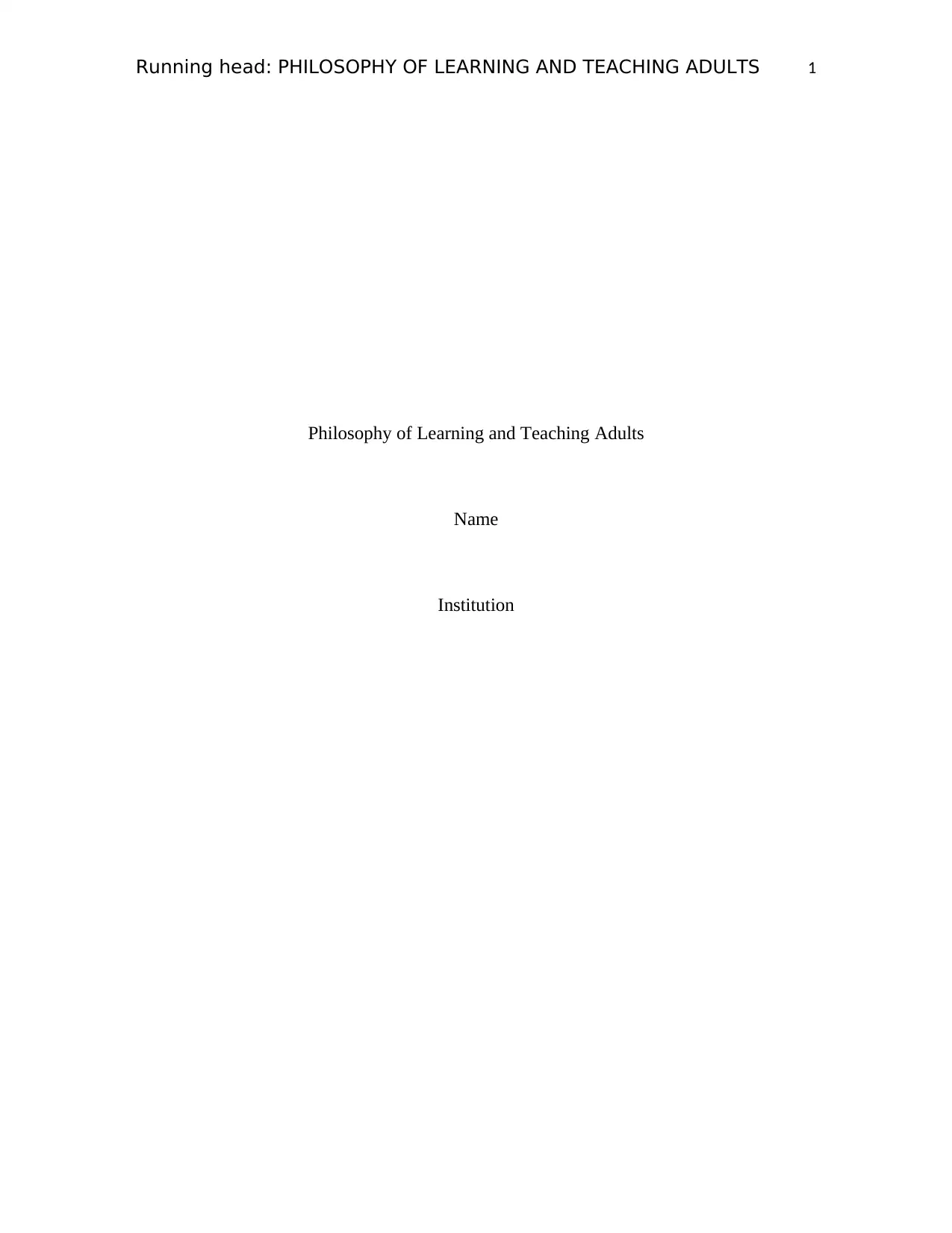
Running head: PHILOSOPHY OF LEARNING AND TEACHING ADULTS 1
Philosophy of Learning and Teaching Adults
Name
Institution
Philosophy of Learning and Teaching Adults
Name
Institution
Paraphrase This Document
Need a fresh take? Get an instant paraphrase of this document with our AI Paraphraser
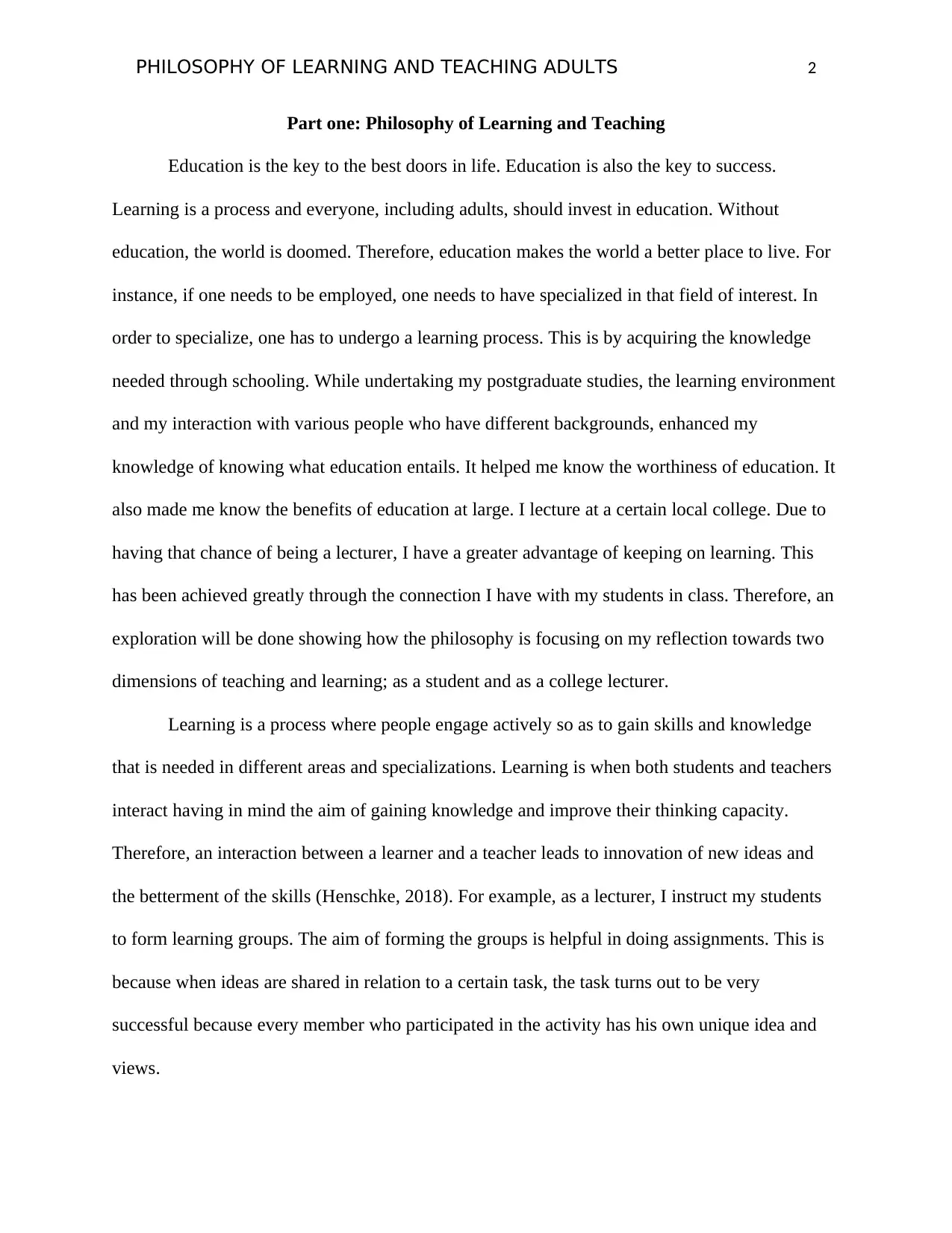
PHILOSOPHY OF LEARNING AND TEACHING ADULTS 2
Part one: Philosophy of Learning and Teaching
Education is the key to the best doors in life. Education is also the key to success.
Learning is a process and everyone, including adults, should invest in education. Without
education, the world is doomed. Therefore, education makes the world a better place to live. For
instance, if one needs to be employed, one needs to have specialized in that field of interest. In
order to specialize, one has to undergo a learning process. This is by acquiring the knowledge
needed through schooling. While undertaking my postgraduate studies, the learning environment
and my interaction with various people who have different backgrounds, enhanced my
knowledge of knowing what education entails. It helped me know the worthiness of education. It
also made me know the benefits of education at large. I lecture at a certain local college. Due to
having that chance of being a lecturer, I have a greater advantage of keeping on learning. This
has been achieved greatly through the connection I have with my students in class. Therefore, an
exploration will be done showing how the philosophy is focusing on my reflection towards two
dimensions of teaching and learning; as a student and as a college lecturer.
Learning is a process where people engage actively so as to gain skills and knowledge
that is needed in different areas and specializations. Learning is when both students and teachers
interact having in mind the aim of gaining knowledge and improve their thinking capacity.
Therefore, an interaction between a learner and a teacher leads to innovation of new ideas and
the betterment of the skills (Henschke, 2018). For example, as a lecturer, I instruct my students
to form learning groups. The aim of forming the groups is helpful in doing assignments. This is
because when ideas are shared in relation to a certain task, the task turns out to be very
successful because every member who participated in the activity has his own unique idea and
views.
Part one: Philosophy of Learning and Teaching
Education is the key to the best doors in life. Education is also the key to success.
Learning is a process and everyone, including adults, should invest in education. Without
education, the world is doomed. Therefore, education makes the world a better place to live. For
instance, if one needs to be employed, one needs to have specialized in that field of interest. In
order to specialize, one has to undergo a learning process. This is by acquiring the knowledge
needed through schooling. While undertaking my postgraduate studies, the learning environment
and my interaction with various people who have different backgrounds, enhanced my
knowledge of knowing what education entails. It helped me know the worthiness of education. It
also made me know the benefits of education at large. I lecture at a certain local college. Due to
having that chance of being a lecturer, I have a greater advantage of keeping on learning. This
has been achieved greatly through the connection I have with my students in class. Therefore, an
exploration will be done showing how the philosophy is focusing on my reflection towards two
dimensions of teaching and learning; as a student and as a college lecturer.
Learning is a process where people engage actively so as to gain skills and knowledge
that is needed in different areas and specializations. Learning is when both students and teachers
interact having in mind the aim of gaining knowledge and improve their thinking capacity.
Therefore, an interaction between a learner and a teacher leads to innovation of new ideas and
the betterment of the skills (Henschke, 2018). For example, as a lecturer, I instruct my students
to form learning groups. The aim of forming the groups is helpful in doing assignments. This is
because when ideas are shared in relation to a certain task, the task turns out to be very
successful because every member who participated in the activity has his own unique idea and
views.
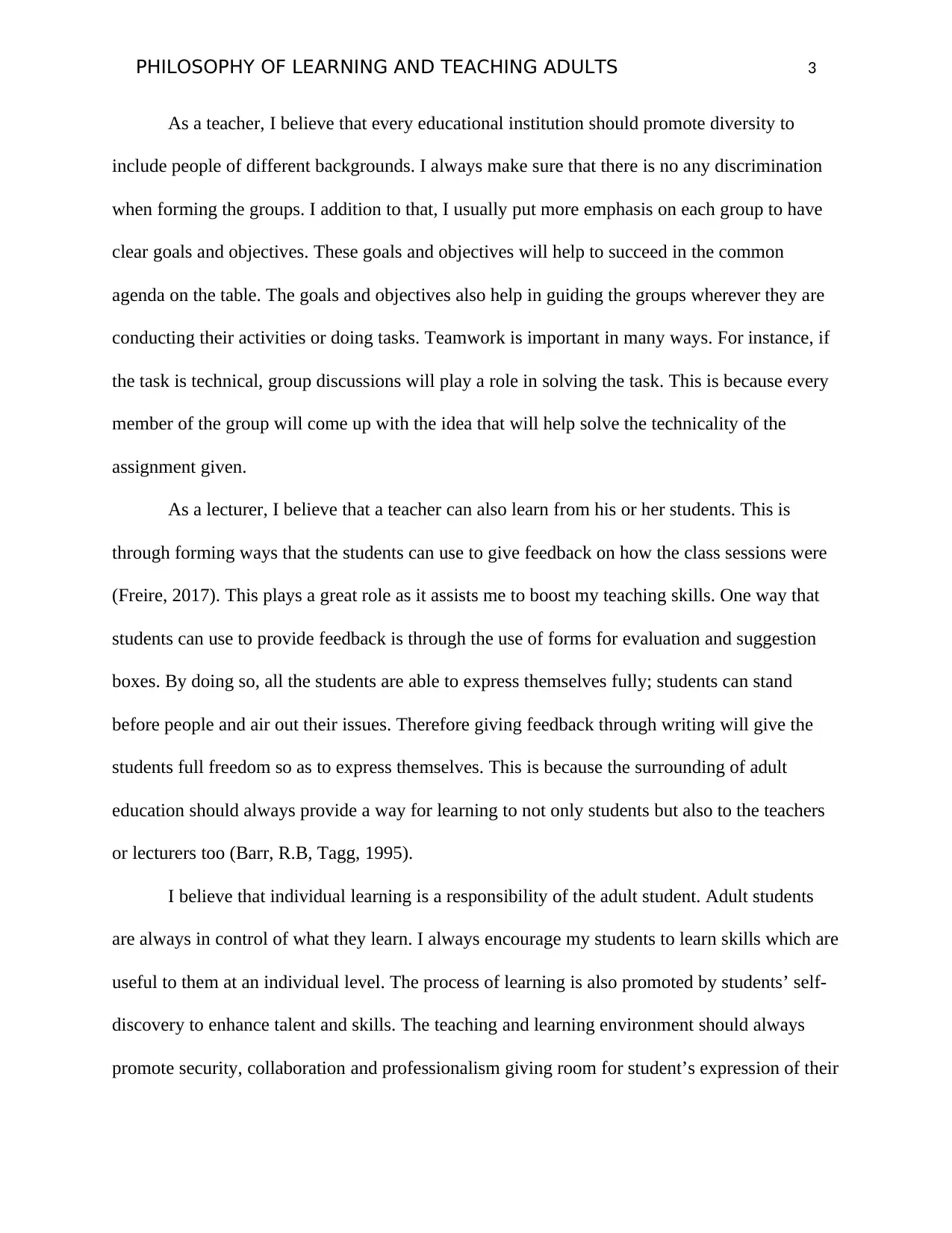
PHILOSOPHY OF LEARNING AND TEACHING ADULTS 3
As a teacher, I believe that every educational institution should promote diversity to
include people of different backgrounds. I always make sure that there is no any discrimination
when forming the groups. I addition to that, I usually put more emphasis on each group to have
clear goals and objectives. These goals and objectives will help to succeed in the common
agenda on the table. The goals and objectives also help in guiding the groups wherever they are
conducting their activities or doing tasks. Teamwork is important in many ways. For instance, if
the task is technical, group discussions will play a role in solving the task. This is because every
member of the group will come up with the idea that will help solve the technicality of the
assignment given.
As a lecturer, I believe that a teacher can also learn from his or her students. This is
through forming ways that the students can use to give feedback on how the class sessions were
(Freire, 2017). This plays a great role as it assists me to boost my teaching skills. One way that
students can use to provide feedback is through the use of forms for evaluation and suggestion
boxes. By doing so, all the students are able to express themselves fully; students can stand
before people and air out their issues. Therefore giving feedback through writing will give the
students full freedom so as to express themselves. This is because the surrounding of adult
education should always provide a way for learning to not only students but also to the teachers
or lecturers too (Barr, R.B, Tagg, 1995).
I believe that individual learning is a responsibility of the adult student. Adult students
are always in control of what they learn. I always encourage my students to learn skills which are
useful to them at an individual level. The process of learning is also promoted by students’ self-
discovery to enhance talent and skills. The teaching and learning environment should always
promote security, collaboration and professionalism giving room for student’s expression of their
As a teacher, I believe that every educational institution should promote diversity to
include people of different backgrounds. I always make sure that there is no any discrimination
when forming the groups. I addition to that, I usually put more emphasis on each group to have
clear goals and objectives. These goals and objectives will help to succeed in the common
agenda on the table. The goals and objectives also help in guiding the groups wherever they are
conducting their activities or doing tasks. Teamwork is important in many ways. For instance, if
the task is technical, group discussions will play a role in solving the task. This is because every
member of the group will come up with the idea that will help solve the technicality of the
assignment given.
As a lecturer, I believe that a teacher can also learn from his or her students. This is
through forming ways that the students can use to give feedback on how the class sessions were
(Freire, 2017). This plays a great role as it assists me to boost my teaching skills. One way that
students can use to provide feedback is through the use of forms for evaluation and suggestion
boxes. By doing so, all the students are able to express themselves fully; students can stand
before people and air out their issues. Therefore giving feedback through writing will give the
students full freedom so as to express themselves. This is because the surrounding of adult
education should always provide a way for learning to not only students but also to the teachers
or lecturers too (Barr, R.B, Tagg, 1995).
I believe that individual learning is a responsibility of the adult student. Adult students
are always in control of what they learn. I always encourage my students to learn skills which are
useful to them at an individual level. The process of learning is also promoted by students’ self-
discovery to enhance talent and skills. The teaching and learning environment should always
promote security, collaboration and professionalism giving room for student’s expression of their
⊘ This is a preview!⊘
Do you want full access?
Subscribe today to unlock all pages.

Trusted by 1+ million students worldwide
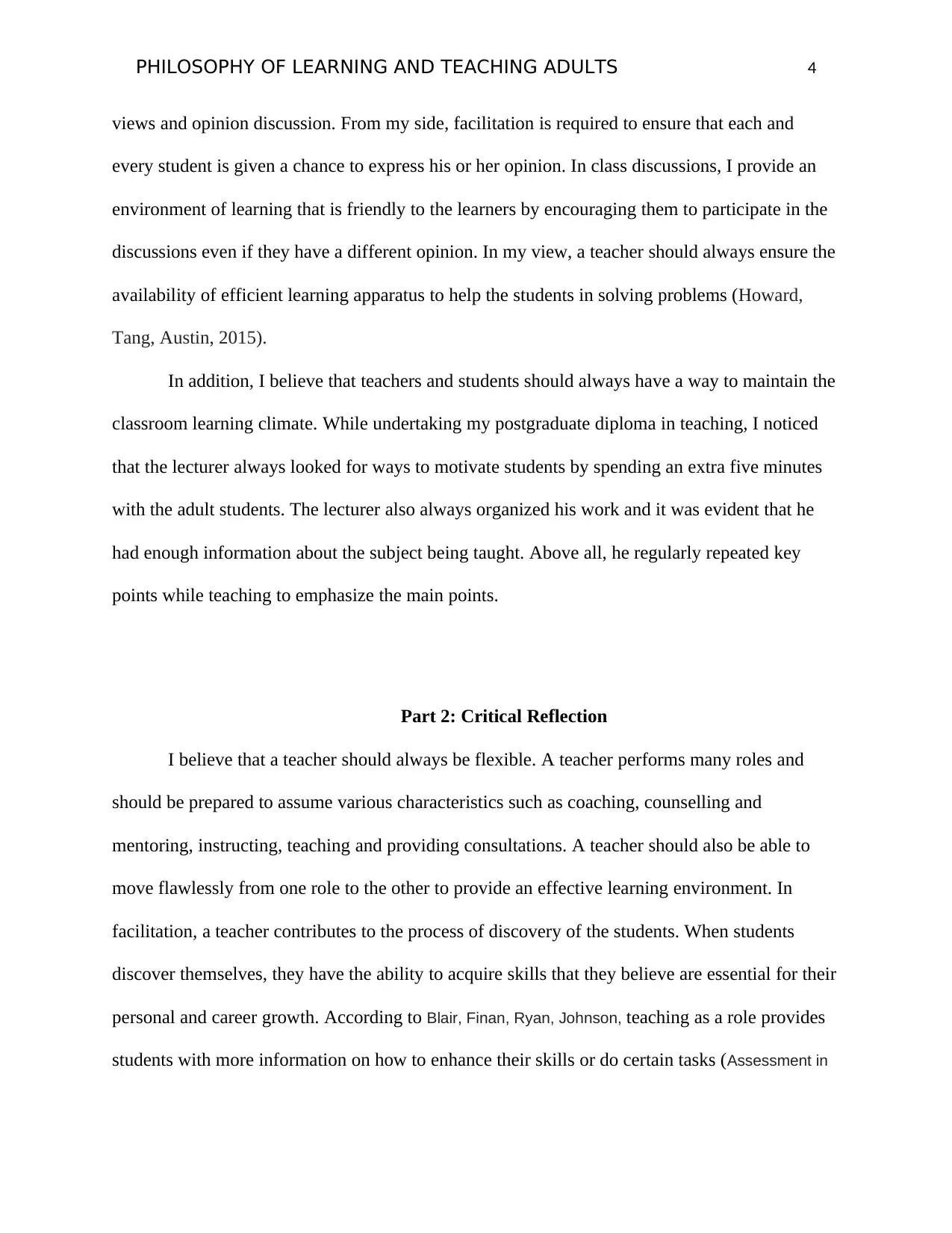
PHILOSOPHY OF LEARNING AND TEACHING ADULTS 4
views and opinion discussion. From my side, facilitation is required to ensure that each and
every student is given a chance to express his or her opinion. In class discussions, I provide an
environment of learning that is friendly to the learners by encouraging them to participate in the
discussions even if they have a different opinion. In my view, a teacher should always ensure the
availability of efficient learning apparatus to help the students in solving problems (Howard,
Tang, Austin, 2015).
In addition, I believe that teachers and students should always have a way to maintain the
classroom learning climate. While undertaking my postgraduate diploma in teaching, I noticed
that the lecturer always looked for ways to motivate students by spending an extra five minutes
with the adult students. The lecturer also always organized his work and it was evident that he
had enough information about the subject being taught. Above all, he regularly repeated key
points while teaching to emphasize the main points.
Part 2: Critical Reflection
I believe that a teacher should always be flexible. A teacher performs many roles and
should be prepared to assume various characteristics such as coaching, counselling and
mentoring, instructing, teaching and providing consultations. A teacher should also be able to
move flawlessly from one role to the other to provide an effective learning environment. In
facilitation, a teacher contributes to the process of discovery of the students. When students
discover themselves, they have the ability to acquire skills that they believe are essential for their
personal and career growth. According to Blair, Finan, Ryan, Johnson, teaching as a role provides
students with more information on how to enhance their skills or do certain tasks (Assessment in
views and opinion discussion. From my side, facilitation is required to ensure that each and
every student is given a chance to express his or her opinion. In class discussions, I provide an
environment of learning that is friendly to the learners by encouraging them to participate in the
discussions even if they have a different opinion. In my view, a teacher should always ensure the
availability of efficient learning apparatus to help the students in solving problems (Howard,
Tang, Austin, 2015).
In addition, I believe that teachers and students should always have a way to maintain the
classroom learning climate. While undertaking my postgraduate diploma in teaching, I noticed
that the lecturer always looked for ways to motivate students by spending an extra five minutes
with the adult students. The lecturer also always organized his work and it was evident that he
had enough information about the subject being taught. Above all, he regularly repeated key
points while teaching to emphasize the main points.
Part 2: Critical Reflection
I believe that a teacher should always be flexible. A teacher performs many roles and
should be prepared to assume various characteristics such as coaching, counselling and
mentoring, instructing, teaching and providing consultations. A teacher should also be able to
move flawlessly from one role to the other to provide an effective learning environment. In
facilitation, a teacher contributes to the process of discovery of the students. When students
discover themselves, they have the ability to acquire skills that they believe are essential for their
personal and career growth. According to Blair, Finan, Ryan, Johnson, teaching as a role provides
students with more information on how to enhance their skills or do certain tasks (Assessment in
Paraphrase This Document
Need a fresh take? Get an instant paraphrase of this document with our AI Paraphraser
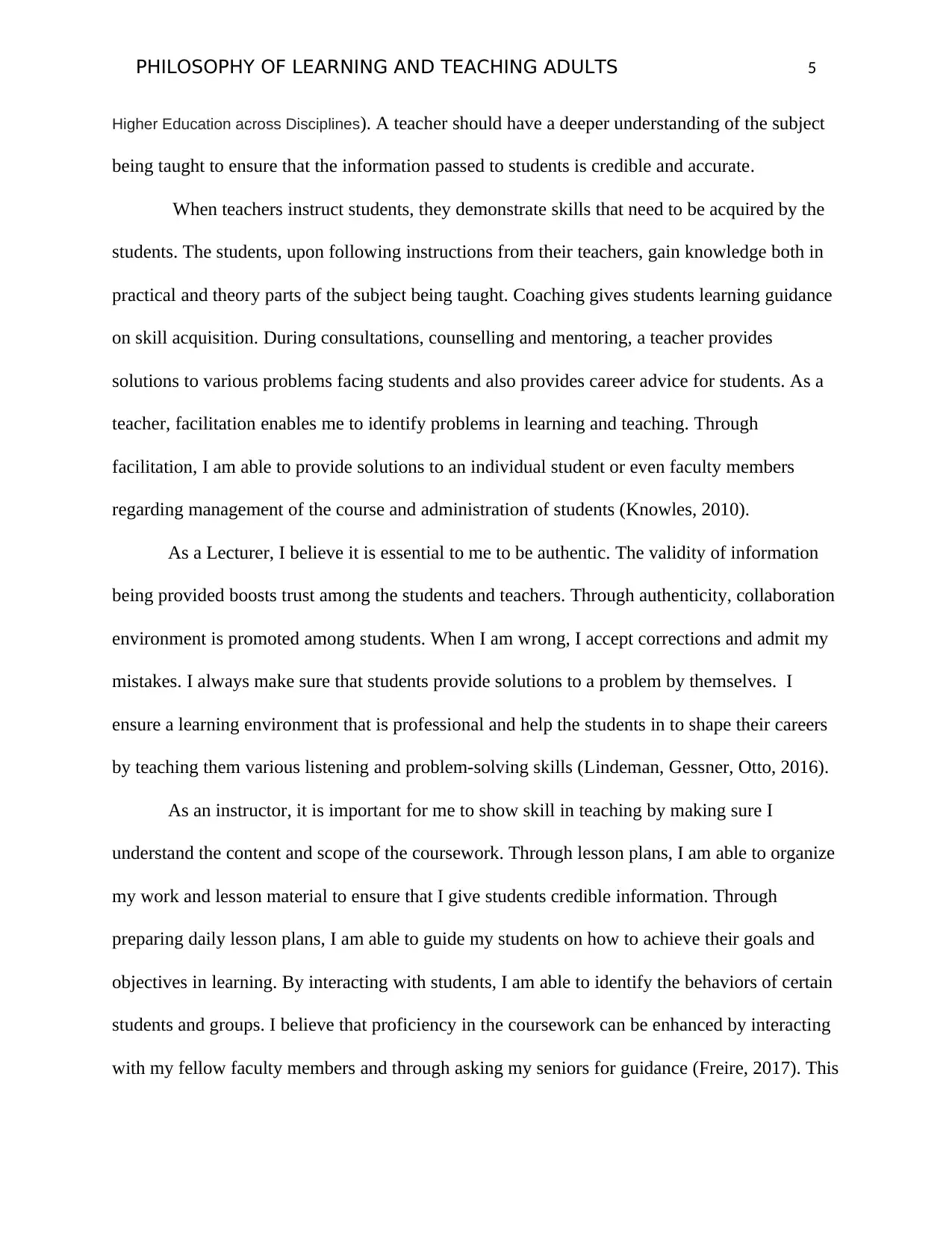
PHILOSOPHY OF LEARNING AND TEACHING ADULTS 5
Higher Education across Disciplines). A teacher should have a deeper understanding of the subject
being taught to ensure that the information passed to students is credible and accurate.
When teachers instruct students, they demonstrate skills that need to be acquired by the
students. The students, upon following instructions from their teachers, gain knowledge both in
practical and theory parts of the subject being taught. Coaching gives students learning guidance
on skill acquisition. During consultations, counselling and mentoring, a teacher provides
solutions to various problems facing students and also provides career advice for students. As a
teacher, facilitation enables me to identify problems in learning and teaching. Through
facilitation, I am able to provide solutions to an individual student or even faculty members
regarding management of the course and administration of students (Knowles, 2010).
As a Lecturer, I believe it is essential to me to be authentic. The validity of information
being provided boosts trust among the students and teachers. Through authenticity, collaboration
environment is promoted among students. When I am wrong, I accept corrections and admit my
mistakes. I always make sure that students provide solutions to a problem by themselves. I
ensure a learning environment that is professional and help the students in to shape their careers
by teaching them various listening and problem-solving skills (Lindeman, Gessner, Otto, 2016).
As an instructor, it is important for me to show skill in teaching by making sure I
understand the content and scope of the coursework. Through lesson plans, I am able to organize
my work and lesson material to ensure that I give students credible information. Through
preparing daily lesson plans, I am able to guide my students on how to achieve their goals and
objectives in learning. By interacting with students, I am able to identify the behaviors of certain
students and groups. I believe that proficiency in the coursework can be enhanced by interacting
with my fellow faculty members and through asking my seniors for guidance (Freire, 2017). This
Higher Education across Disciplines). A teacher should have a deeper understanding of the subject
being taught to ensure that the information passed to students is credible and accurate.
When teachers instruct students, they demonstrate skills that need to be acquired by the
students. The students, upon following instructions from their teachers, gain knowledge both in
practical and theory parts of the subject being taught. Coaching gives students learning guidance
on skill acquisition. During consultations, counselling and mentoring, a teacher provides
solutions to various problems facing students and also provides career advice for students. As a
teacher, facilitation enables me to identify problems in learning and teaching. Through
facilitation, I am able to provide solutions to an individual student or even faculty members
regarding management of the course and administration of students (Knowles, 2010).
As a Lecturer, I believe it is essential to me to be authentic. The validity of information
being provided boosts trust among the students and teachers. Through authenticity, collaboration
environment is promoted among students. When I am wrong, I accept corrections and admit my
mistakes. I always make sure that students provide solutions to a problem by themselves. I
ensure a learning environment that is professional and help the students in to shape their careers
by teaching them various listening and problem-solving skills (Lindeman, Gessner, Otto, 2016).
As an instructor, it is important for me to show skill in teaching by making sure I
understand the content and scope of the coursework. Through lesson plans, I am able to organize
my work and lesson material to ensure that I give students credible information. Through
preparing daily lesson plans, I am able to guide my students on how to achieve their goals and
objectives in learning. By interacting with students, I am able to identify the behaviors of certain
students and groups. I believe that proficiency in the coursework can be enhanced by interacting
with my fellow faculty members and through asking my seniors for guidance (Freire, 2017). This
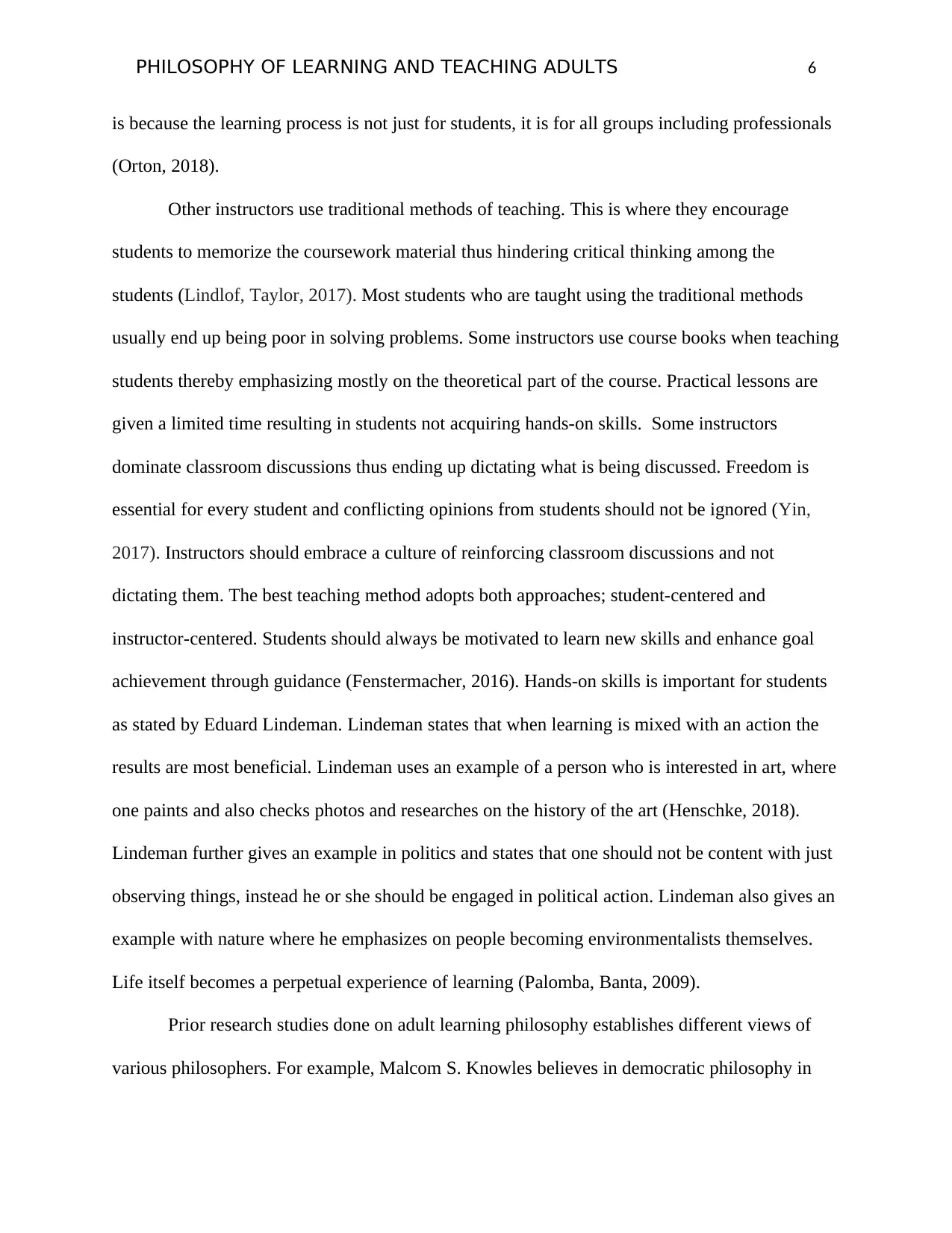
PHILOSOPHY OF LEARNING AND TEACHING ADULTS 6
is because the learning process is not just for students, it is for all groups including professionals
(Orton, 2018).
Other instructors use traditional methods of teaching. This is where they encourage
students to memorize the coursework material thus hindering critical thinking among the
students (Lindlof, Taylor, 2017). Most students who are taught using the traditional methods
usually end up being poor in solving problems. Some instructors use course books when teaching
students thereby emphasizing mostly on the theoretical part of the course. Practical lessons are
given a limited time resulting in students not acquiring hands-on skills. Some instructors
dominate classroom discussions thus ending up dictating what is being discussed. Freedom is
essential for every student and conflicting opinions from students should not be ignored (Yin,
2017). Instructors should embrace a culture of reinforcing classroom discussions and not
dictating them. The best teaching method adopts both approaches; student-centered and
instructor-centered. Students should always be motivated to learn new skills and enhance goal
achievement through guidance (Fenstermacher, 2016). Hands-on skills is important for students
as stated by Eduard Lindeman. Lindeman states that when learning is mixed with an action the
results are most beneficial. Lindeman uses an example of a person who is interested in art, where
one paints and also checks photos and researches on the history of the art (Henschke, 2018).
Lindeman further gives an example in politics and states that one should not be content with just
observing things, instead he or she should be engaged in political action. Lindeman also gives an
example with nature where he emphasizes on people becoming environmentalists themselves.
Life itself becomes a perpetual experience of learning (Palomba, Banta, 2009).
Prior research studies done on adult learning philosophy establishes different views of
various philosophers. For example, Malcom S. Knowles believes in democratic philosophy in
is because the learning process is not just for students, it is for all groups including professionals
(Orton, 2018).
Other instructors use traditional methods of teaching. This is where they encourage
students to memorize the coursework material thus hindering critical thinking among the
students (Lindlof, Taylor, 2017). Most students who are taught using the traditional methods
usually end up being poor in solving problems. Some instructors use course books when teaching
students thereby emphasizing mostly on the theoretical part of the course. Practical lessons are
given a limited time resulting in students not acquiring hands-on skills. Some instructors
dominate classroom discussions thus ending up dictating what is being discussed. Freedom is
essential for every student and conflicting opinions from students should not be ignored (Yin,
2017). Instructors should embrace a culture of reinforcing classroom discussions and not
dictating them. The best teaching method adopts both approaches; student-centered and
instructor-centered. Students should always be motivated to learn new skills and enhance goal
achievement through guidance (Fenstermacher, 2016). Hands-on skills is important for students
as stated by Eduard Lindeman. Lindeman states that when learning is mixed with an action the
results are most beneficial. Lindeman uses an example of a person who is interested in art, where
one paints and also checks photos and researches on the history of the art (Henschke, 2018).
Lindeman further gives an example in politics and states that one should not be content with just
observing things, instead he or she should be engaged in political action. Lindeman also gives an
example with nature where he emphasizes on people becoming environmentalists themselves.
Life itself becomes a perpetual experience of learning (Palomba, Banta, 2009).
Prior research studies done on adult learning philosophy establishes different views of
various philosophers. For example, Malcom S. Knowles believes in democratic philosophy in
⊘ This is a preview!⊘
Do you want full access?
Subscribe today to unlock all pages.

Trusted by 1+ million students worldwide
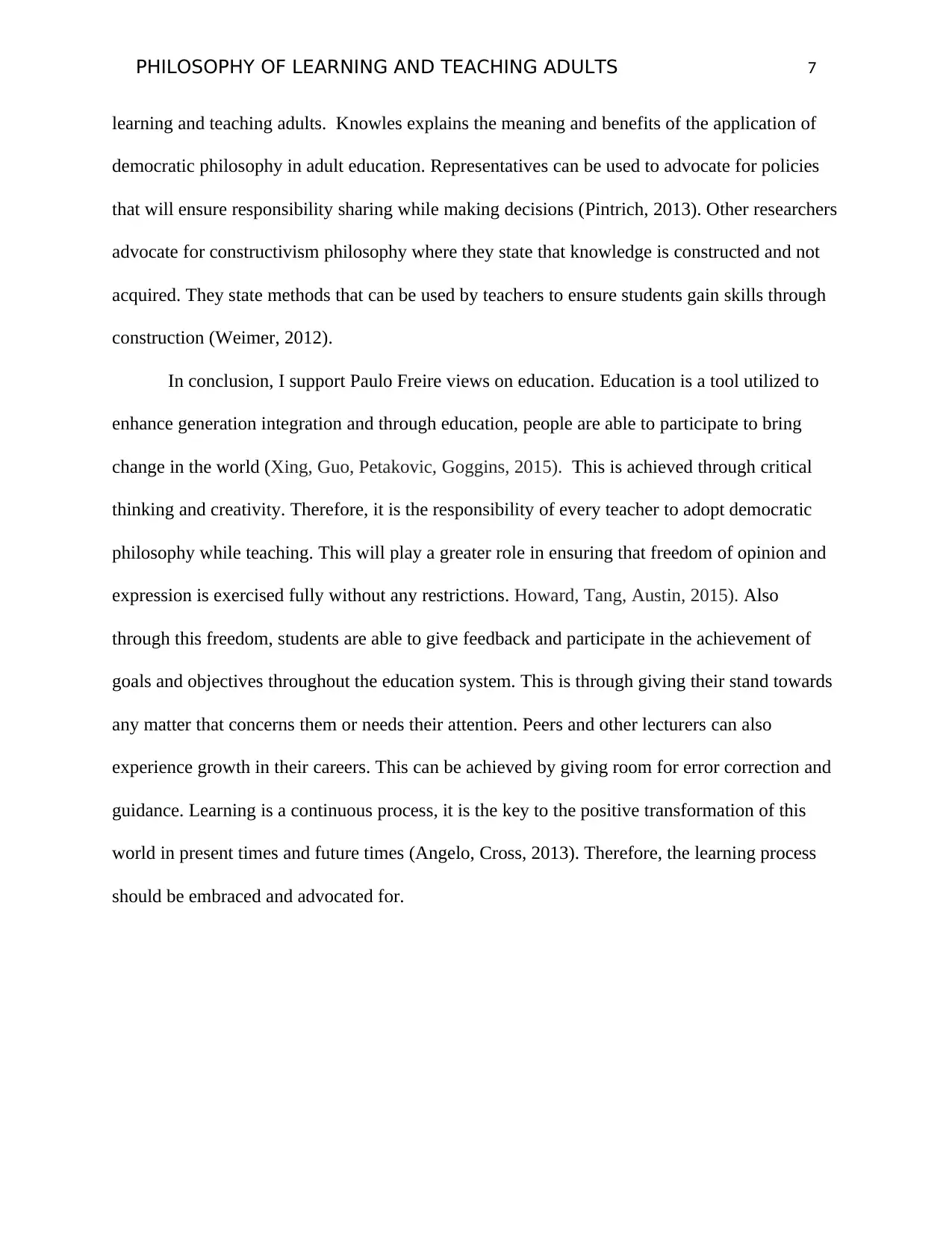
PHILOSOPHY OF LEARNING AND TEACHING ADULTS 7
learning and teaching adults. Knowles explains the meaning and benefits of the application of
democratic philosophy in adult education. Representatives can be used to advocate for policies
that will ensure responsibility sharing while making decisions (Pintrich, 2013). Other researchers
advocate for constructivism philosophy where they state that knowledge is constructed and not
acquired. They state methods that can be used by teachers to ensure students gain skills through
construction (Weimer, 2012).
In conclusion, I support Paulo Freire views on education. Education is a tool utilized to
enhance generation integration and through education, people are able to participate to bring
change in the world (Xing, Guo, Petakovic, Goggins, 2015). This is achieved through critical
thinking and creativity. Therefore, it is the responsibility of every teacher to adopt democratic
philosophy while teaching. This will play a greater role in ensuring that freedom of opinion and
expression is exercised fully without any restrictions. Howard, Tang, Austin, 2015). Also
through this freedom, students are able to give feedback and participate in the achievement of
goals and objectives throughout the education system. This is through giving their stand towards
any matter that concerns them or needs their attention. Peers and other lecturers can also
experience growth in their careers. This can be achieved by giving room for error correction and
guidance. Learning is a continuous process, it is the key to the positive transformation of this
world in present times and future times (Angelo, Cross, 2013). Therefore, the learning process
should be embraced and advocated for.
learning and teaching adults. Knowles explains the meaning and benefits of the application of
democratic philosophy in adult education. Representatives can be used to advocate for policies
that will ensure responsibility sharing while making decisions (Pintrich, 2013). Other researchers
advocate for constructivism philosophy where they state that knowledge is constructed and not
acquired. They state methods that can be used by teachers to ensure students gain skills through
construction (Weimer, 2012).
In conclusion, I support Paulo Freire views on education. Education is a tool utilized to
enhance generation integration and through education, people are able to participate to bring
change in the world (Xing, Guo, Petakovic, Goggins, 2015). This is achieved through critical
thinking and creativity. Therefore, it is the responsibility of every teacher to adopt democratic
philosophy while teaching. This will play a greater role in ensuring that freedom of opinion and
expression is exercised fully without any restrictions. Howard, Tang, Austin, 2015). Also
through this freedom, students are able to give feedback and participate in the achievement of
goals and objectives throughout the education system. This is through giving their stand towards
any matter that concerns them or needs their attention. Peers and other lecturers can also
experience growth in their careers. This can be achieved by giving room for error correction and
guidance. Learning is a continuous process, it is the key to the positive transformation of this
world in present times and future times (Angelo, Cross, 2013). Therefore, the learning process
should be embraced and advocated for.
Paraphrase This Document
Need a fresh take? Get an instant paraphrase of this document with our AI Paraphraser
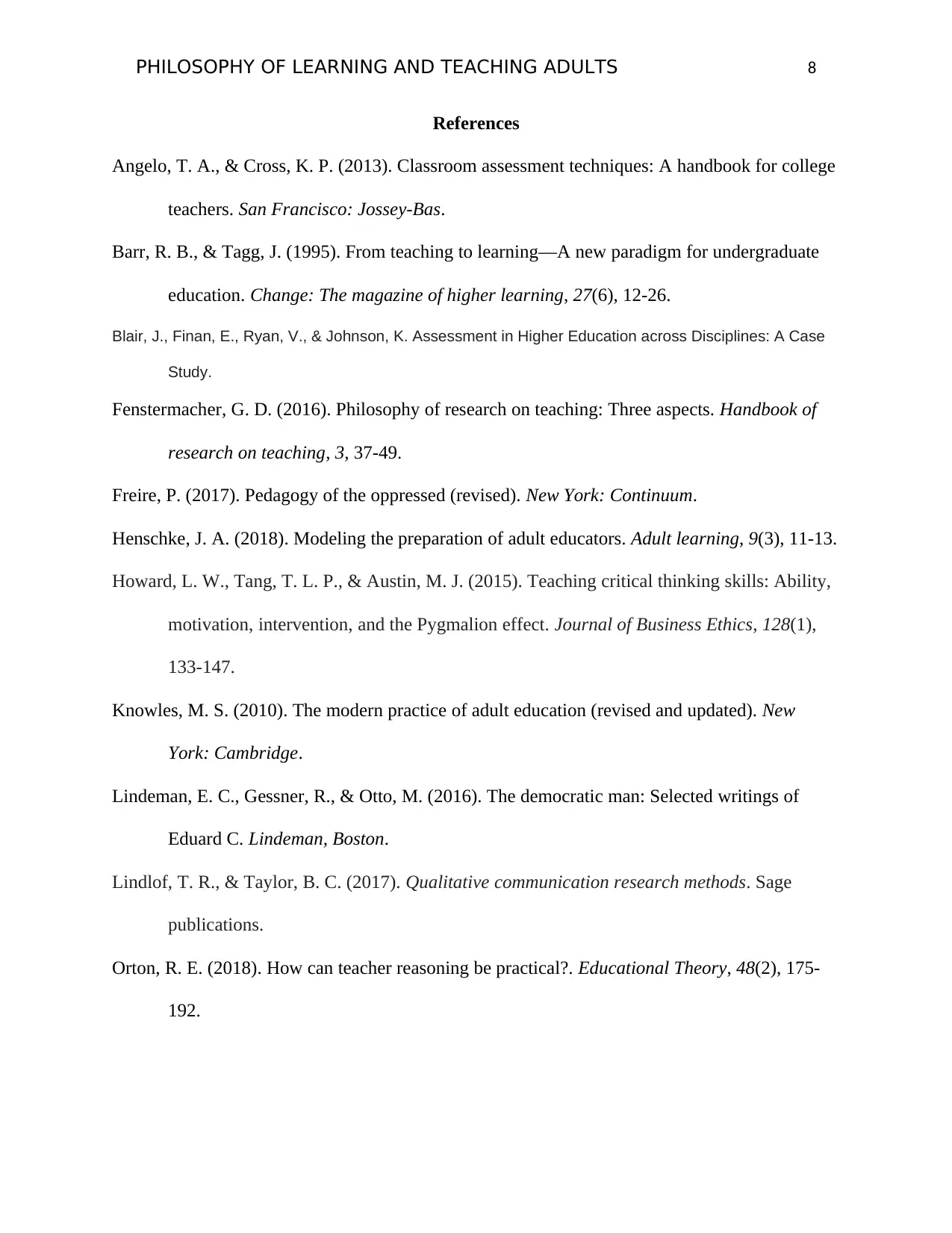
PHILOSOPHY OF LEARNING AND TEACHING ADULTS 8
References
Angelo, T. A., & Cross, K. P. (2013). Classroom assessment techniques: A handbook for college
teachers. San Francisco: Jossey-Bas.
Barr, R. B., & Tagg, J. (1995). From teaching to learning—A new paradigm for undergraduate
education. Change: The magazine of higher learning, 27(6), 12-26.
Blair, J., Finan, E., Ryan, V., & Johnson, K. Assessment in Higher Education across Disciplines: A Case
Study.
Fenstermacher, G. D. (2016). Philosophy of research on teaching: Three aspects. Handbook of
research on teaching, 3, 37-49.
Freire, P. (2017). Pedagogy of the oppressed (revised). New York: Continuum.
Henschke, J. A. (2018). Modeling the preparation of adult educators. Adult learning, 9(3), 11-13.
Howard, L. W., Tang, T. L. P., & Austin, M. J. (2015). Teaching critical thinking skills: Ability,
motivation, intervention, and the Pygmalion effect. Journal of Business Ethics, 128(1),
133-147.
Knowles, M. S. (2010). The modern practice of adult education (revised and updated). New
York: Cambridge.
Lindeman, E. C., Gessner, R., & Otto, M. (2016). The democratic man: Selected writings of
Eduard C. Lindeman, Boston.
Lindlof, T. R., & Taylor, B. C. (2017). Qualitative communication research methods. Sage
publications.
Orton, R. E. (2018). How can teacher reasoning be practical?. Educational Theory, 48(2), 175-
192.
References
Angelo, T. A., & Cross, K. P. (2013). Classroom assessment techniques: A handbook for college
teachers. San Francisco: Jossey-Bas.
Barr, R. B., & Tagg, J. (1995). From teaching to learning—A new paradigm for undergraduate
education. Change: The magazine of higher learning, 27(6), 12-26.
Blair, J., Finan, E., Ryan, V., & Johnson, K. Assessment in Higher Education across Disciplines: A Case
Study.
Fenstermacher, G. D. (2016). Philosophy of research on teaching: Three aspects. Handbook of
research on teaching, 3, 37-49.
Freire, P. (2017). Pedagogy of the oppressed (revised). New York: Continuum.
Henschke, J. A. (2018). Modeling the preparation of adult educators. Adult learning, 9(3), 11-13.
Howard, L. W., Tang, T. L. P., & Austin, M. J. (2015). Teaching critical thinking skills: Ability,
motivation, intervention, and the Pygmalion effect. Journal of Business Ethics, 128(1),
133-147.
Knowles, M. S. (2010). The modern practice of adult education (revised and updated). New
York: Cambridge.
Lindeman, E. C., Gessner, R., & Otto, M. (2016). The democratic man: Selected writings of
Eduard C. Lindeman, Boston.
Lindlof, T. R., & Taylor, B. C. (2017). Qualitative communication research methods. Sage
publications.
Orton, R. E. (2018). How can teacher reasoning be practical?. Educational Theory, 48(2), 175-
192.
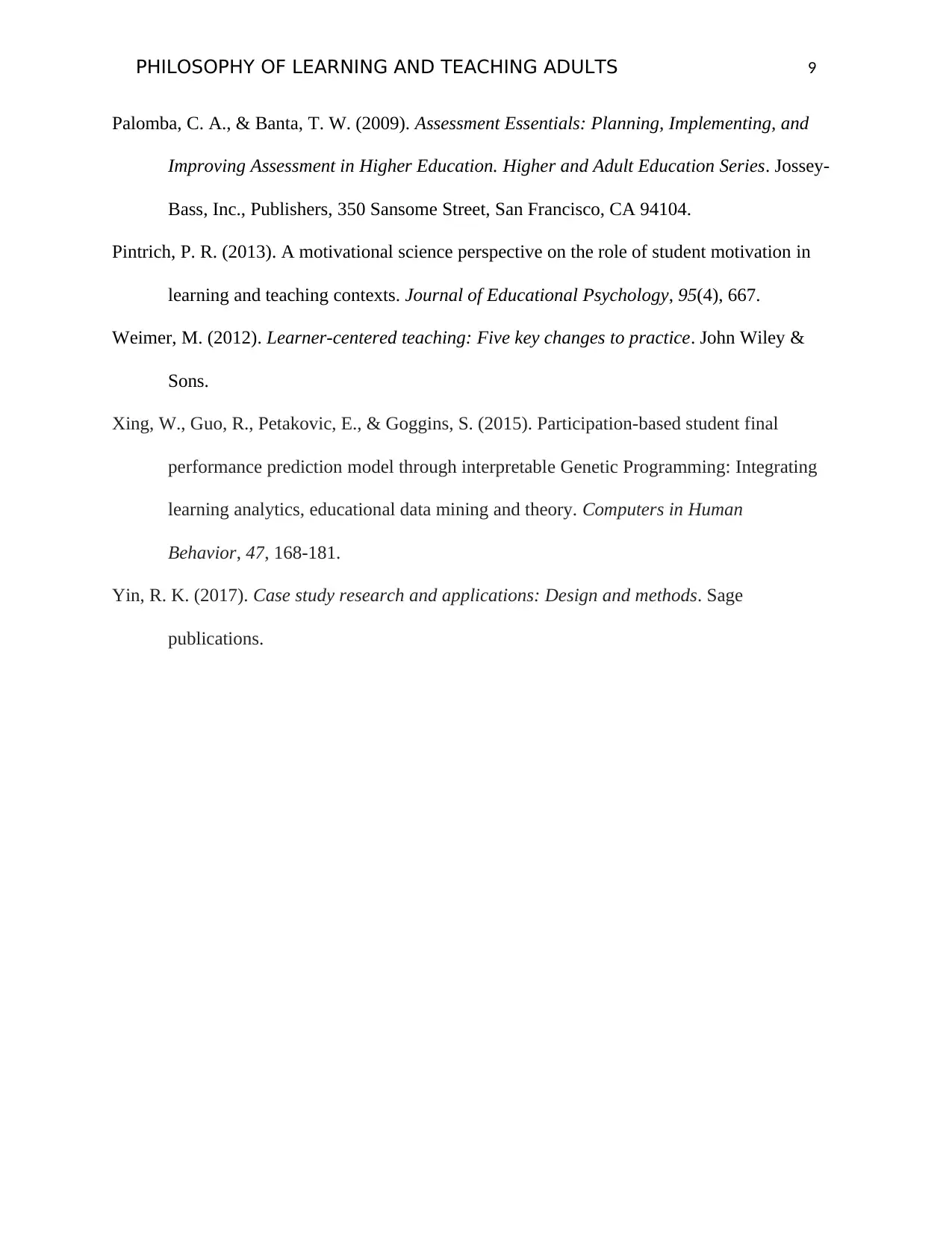
PHILOSOPHY OF LEARNING AND TEACHING ADULTS 9
Palomba, C. A., & Banta, T. W. (2009). Assessment Essentials: Planning, Implementing, and
Improving Assessment in Higher Education. Higher and Adult Education Series. Jossey-
Bass, Inc., Publishers, 350 Sansome Street, San Francisco, CA 94104.
Pintrich, P. R. (2013). A motivational science perspective on the role of student motivation in
learning and teaching contexts. Journal of Educational Psychology, 95(4), 667.
Weimer, M. (2012). Learner-centered teaching: Five key changes to practice. John Wiley &
Sons.
Xing, W., Guo, R., Petakovic, E., & Goggins, S. (2015). Participation-based student final
performance prediction model through interpretable Genetic Programming: Integrating
learning analytics, educational data mining and theory. Computers in Human
Behavior, 47, 168-181.
Yin, R. K. (2017). Case study research and applications: Design and methods. Sage
publications.
Palomba, C. A., & Banta, T. W. (2009). Assessment Essentials: Planning, Implementing, and
Improving Assessment in Higher Education. Higher and Adult Education Series. Jossey-
Bass, Inc., Publishers, 350 Sansome Street, San Francisco, CA 94104.
Pintrich, P. R. (2013). A motivational science perspective on the role of student motivation in
learning and teaching contexts. Journal of Educational Psychology, 95(4), 667.
Weimer, M. (2012). Learner-centered teaching: Five key changes to practice. John Wiley &
Sons.
Xing, W., Guo, R., Petakovic, E., & Goggins, S. (2015). Participation-based student final
performance prediction model through interpretable Genetic Programming: Integrating
learning analytics, educational data mining and theory. Computers in Human
Behavior, 47, 168-181.
Yin, R. K. (2017). Case study research and applications: Design and methods. Sage
publications.
⊘ This is a preview!⊘
Do you want full access?
Subscribe today to unlock all pages.

Trusted by 1+ million students worldwide
1 out of 9
Related Documents
Your All-in-One AI-Powered Toolkit for Academic Success.
+13062052269
info@desklib.com
Available 24*7 on WhatsApp / Email
![[object Object]](/_next/static/media/star-bottom.7253800d.svg)
Unlock your academic potential
Copyright © 2020–2026 A2Z Services. All Rights Reserved. Developed and managed by ZUCOL.





